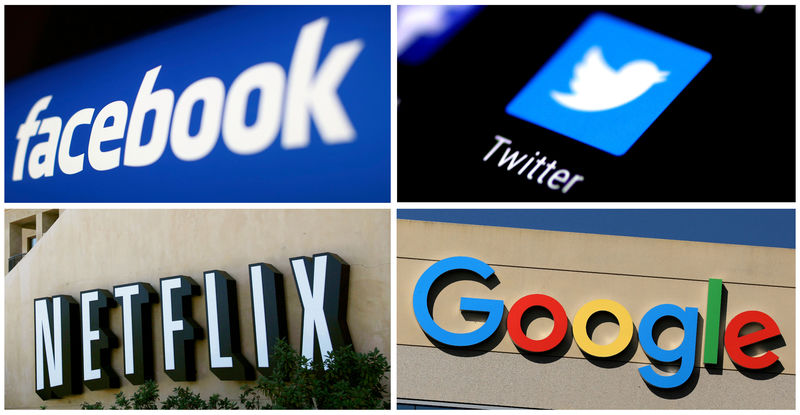By Alden Bentley
NEW YORK (Reuters) - The most significant changes to Wall Street's broad industry sectors since 1999 will take effect Monday, reclassifying many of the hot growth companies that have been nearly synonymous with the "tech" rally that has fuelled the stock bull market.
While any immediate market impact will be hard to gauge, investors are preparing for volatility in stocks being moved from one industry to another when some investors readjust portfolios.
It may affect how mutual fund managers chose stocks and force passively-managed sector exchange traded funds (ETFs) to reallocate billions of dollars.
WHAT ARE THE MOST IMPORTANT CHANGES?
S&P Dow Jones Indices is reorganizing the Global Industry Classification Standard (GICS).
It means none of the so-called FANG stocks - Facebook Inc (O:FB), Amazon.com Inc (O:AMZN), Netflix Inc (O:NFLX) and Google parent Alphabet Inc (O:GOOGL) - will remain in the S&P's information technology sector (SPLRCT).
Facebook and Alphabet will leave tech to join an expanded S&P telecom group, renamed communications services, along with Twitter Inc (N:TWTR). They will accompany AT&T Inc (N:T), Verizon Communications Inc (N:VZ) and CenturyLink Inc (N:CTL), which made up the old telecommunications services sector (SPLRCL).
Apple Inc (O:AAPL), part of the extended FAANG group, will stay in the S&P technology index. It will account for 20 percent of the index's market capitalisation, up from 16 percent, once Alphabet and Facebook leave.
Other names moving from technology to communications services include PayPal Holdings Inc (O:PYPL) and videogame makers Electronic Arts Inc (O:EA) and Activision Blizzard Inc (O:ATVI).
Netflix will move to communications services from the consumer discretionary sector (SPLRCD), where it resided alongside Amazon.com, which will remain. Consumer discretionary heavyweights Walt Disney Co (N:DIS) and Comcast Corp (O:CMCSA) will also move to the new sector.
For a table of affected stocks, see.
S&P will make the changes after the close on Friday. MSCI, another index provider, will make the changes in November.
WHY IS IT HAPPENING?
The changes are meant to reflect how the tech, media and consumer industries have evolved.
Maintained by S&P and MSCI since 1999 and widely used by portfolio managers, the taxonomy classifies companies across 11 sectors. The most recently created sector was real estate <.SPLRCR>, split off from financials (SPSY) in 2016. The move allowed an easier route to invest in real estate investment trusts (REITs).
"The changes are a step towards acknowledging the convergence of telecommunications, media, and select internet companies and the overlapping services rendered by these companies, within the GICS Structure," S&P wrote in a note.
UBS in a research paper said telecoms have moved away from voice telephony to focus on fixed and mobile broadband data that is increasingly bundled with video content.
"This business model looks a lot like what cable TV companies are offering," the investment bank said.
Meanwhile, with only three constituents, the old telecom sector was only 2 percent of the S&P 500 "making it somewhat of an afterthought for many investors."
WHY IS IT IMPORTANT?
Stocks being shifted account for about 8 percent of the S&P 500, and S&P sub-indexes will also reflect the changes on Monday. Select Dow Jones indexes will be affected, S&P said.
A higher weight in communication services and lower profile in technology will make sector composition more balanced, BMO Capital Markets Chief Investment Strategist Brian Belski wrote.
The renamed communications services sector will include three out of four FANGs, even though investors widely view them as the leaders of a tech rally that has powered the stock market in recent years.
While the technology sector's importance in the S&P 500 will fall from 26 percent to 20 percent, the changes will also increase the weight of smaller tech companies. After Apple, Microsoft Corp (O:MSFT), Visa Inc (N:V), Intel Corp (O:INTC) and Cisco Systems Inc (O:CSCO) will round out the S&P tech index's largest five components.
HOW ARE INVESTORS POSITIONING?
UBS said it did not expect the reclassification to significantly impact the trading of the three sectors. "It has been well telegraphed by S&P and MSCI and market participants have been preparing for these changes for several months."
Leading fund provider Vanguard Group started transitioning its sector ETFs in the June quarter, while State Street Global Advisors (N:STT) has already launched a new fund tracking communication services.
Some active portfolio managers may ignore the new sector classifications. A number of telecommunications funds, for instance, compare their performance to utilities indexes or other benchmarks that will not be affected by the GICS changes.
A technology mutual fund could hold Facebook even though it is no longer in the information technology index that the fund is measured against. And some funds use their own customised sector groupings that differ from GICS.
"Managers are going to be reluctant followers (of the sector changes) because they're still going to want to choose stocks that fit their criteria," said Todd Rosenbluth, director of ETF and mutual fund research at CFRA.
Still, many such rule-based investment managers are constrained by contracts or company policy from deviating too much from specific sectors, according to Rosenbluth.
"For some funds, being significantly underweight or overweight a sector that's as sizeable as communication services, or as sizeable as tech or consumer discretionary, is going to be problematic ... so I do think there are going to be stock movements as a result of this."

(This version of the story corrects paragraph five and six to clarify that only two FANG stocks were in information technology sector.)